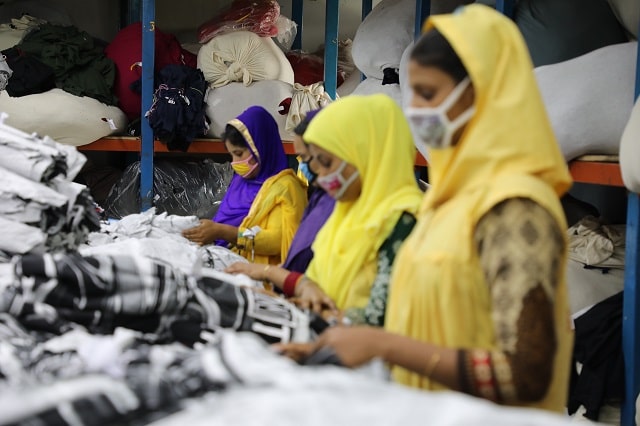A recent study of 1,000 readymade garments (RMG) factories found some fashion brands ‘involved in unfair practices and paying the country’s traders less than the production cost, exploiting garment workers, according to the study published by Aberdeen University and the advocacy group Transform Trade.
The study accused leading fashion brands including H&M, Zara, Lidl and GAP, New Yorker, Primark, Next and others. During the pandemic times, over half of the apparel factories witnessed at least one of the following: order cancellations, refusal to pay, price reductions, or delayed payment for goods.

More importantly, the study also found that one in five factories had difficulties paying the legal minimum wage of garment workers since they reopened after the March and April 2020 lockdown. While most factories are undercutting prices to survive.
The study stated, “Such unfair trading practices impacted suppliers’ employment practices resulting in worker turnover, loss of jobs and lower wages.”
Aberdeen University study also found that some firms’ brands wanted price discounts for garments ordered before the pandemic started in March 2020, while some others declined to budge on price, despite rising costs and extensive inflation.
Muhammad Azizul Islam, Professor of Sustainability Accounting and Transparency at the University of Aberdeen and the project’s Lead, said bigger brands buying from many factories were engaging in unfair purchasing practices more frequently than smaller brands, according to suppliers.
“One in five factories surveyed for the research said they struggled to pay Bangladesh’s £2.30 a day minimum wage.”
“Two years on from the start of the pandemic, Bangladeshi garment workers were not being paid enough to live on, with one in five manufacturers struggling to pay minimum wage while many fashion brands which use Bangladeshi labor increased their profits,” Prof. Azizul Islam said.
“Brands say in their reports that they have a commitment to the workers and they have made progress, but transparency is a big problem in the sector and it is difficult to establish if certain products are ethically produced,” Professor Muhammad Azizul Islam further said.
The study suggested creating a fashion watchdog that would help to limit unfair practices by ensuring ‘that buyers/retailers cannot take unjust and inappropriate risks onto their suppliers and that retailers and brands conform to the norms of fair commercial practices”.
What brands say
As usual, numerous retailers and brands denied the claims made in the report.
Inditex said it has “Guaranteed payment for all orders already placed and in process of production and worked with financial institutions to facilitate the provision of loans to suppliers on favorable terms”.
German supermarket chain Lidl said it took the “accusations very seriously”, adding that it “takes its responsibility towards workers in Bangladesh and other countries where our suppliers produce very seriously and is committed to ensuring that core social standards are complied with throughout the supply chain”.
Primark said that, owing to the pandemic, it had taken “The incredibly difficult decision in March 2020 to cancel all orders which had not yet been handed over”.
What Bangladesh apparel leaders say
Faruque Hassan, President of the Bangladesh Garment Manufacturers and Exporters Association (BGMEA), said, “This study will aid us in alerting consumers about pressuring retailers to pay ethical prices for garments.”
” BGMEA is very translucent in terms of child labor, enforced labor, and workplace safety in the RMG industry. while buyers are asking for transparency but they are not transparent to their consumers or suppliers,” BGMEA President said.
If customers, buyers, and retailers pay fair prices, our apparel factory owners will be able to pay better wages to their workers, added the BGMEA president.
Mohammad Hatem, Executive President of the Bangladesh Knitwear Manufacturers and Exporters Association (BKMEA) said, “Global buyers are always trying to decrease RMG prices, in some cases even offering lower than the production costs.”
“Brands always take advantage of manufacturers’ weaknesses. And if any manufacturer faces a lack of orders than their production capacity, then buyers grab the opportunity and offer lower prices. Since now the global clothing market is experiencing slow demand, buyers are trying to trade in on that. And in some instances, brands also make corrupt competition among factories to lessen prices,” said Mohammad Hatem.
On the other hand, when raw prices go down a little, buyers push manufacturers to reduce prices even by more than double the reduced material costs, he added.
This malpractice is not new in the Bangladesh apparel industry. Recently, International Trade Centre (ITC) recent report titled ‘The Garment Costing Guide for Small Firms in Value Chains’ claims that Bangladesh’s FoB prices are lower than even Pakistan and Cambodia – Furthermore, the prices of Bangladesh’s apparel manufacturers get far lower the global average rate. While Vietnam, Indonesia, Turkey and Mexico like apparel manufacturing countries are always getting paid above the global average.
















